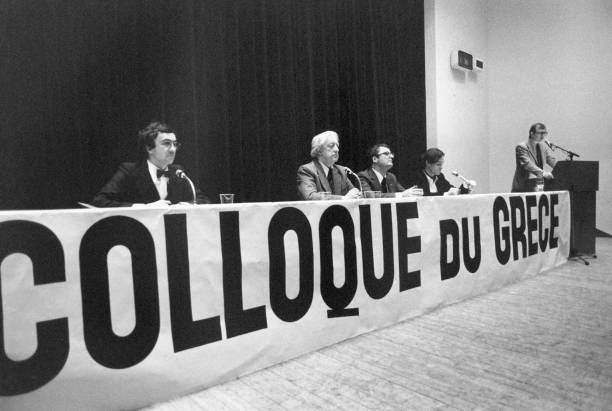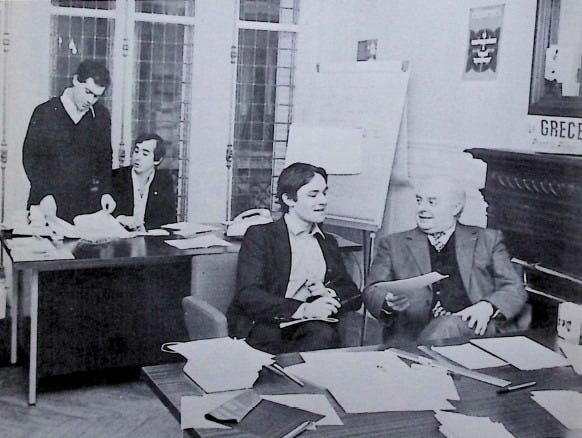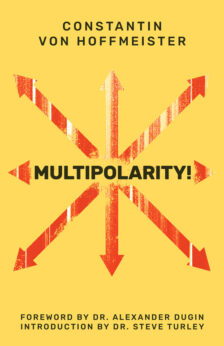The anniversary of the founding of the Groupement de Recherche et d’Études pour la Civilisation Européenne (GRECE) provides a significant opportunity to reflect on its rich history, the ideas it has championed, and its enduring legacy in shaping cultural and intellectual discourse in Europe. Since its official inception in 1969 (though metapolitical activities started prior), GRECE has remained a pivotal institution in the realm of metapolitical thought, advocating for a cultural rebirth grounded in European traditions, values, and identity.

Alain de Benoist and Jean-Claude Valla
The Origins and Early Years
GRECE was established at a time of considerable political and cultural upheaval. The revolutions of 1968, which swept across Europe, marked a profound rejection of traditional structures and ideologies. Amidst this turbulence, GRECE sought to counteract what its founders saw as the pervasive influence of liberal modernity and cultural homogenization. Alain de Benoist, one of the group’s key figures, articulated a vision of cultural renewal that transcended mere political activism, aiming instead to engage in a deeper intellectual and philosophical transformation.
The organization’s founding was steeped in the principles of metapolitics, a strategy inspired by the Italian Marxist thinker Antonio Gramsci. Metapolitics focuses on influencing cultural and intellectual life to bring about long-term ideological change. GRECE’s efforts were concentrated on promoting ideas through publications, seminars, and collaborations with thinkers across Europe. This approach sought to establish a “new culture” as a foundation for a “new right” (a title that was bestowed upon them by the media) distinct from traditional conservative movements.

Left to Right: Hubert Demirleau, Yvan Blot, and Jean-Claude Valla
Core Ideas and Intellectual Contributions
The intellectual output of GRECE has been vast and varied, touching upon themes of identity, tradition, and the critique of modernity. Central to its philosophy is the concept of rootedness, an idea that emphasizes the importance of cultural and historical continuity. This stands in stark contrast to the cosmopolitan ethos of liberal modernity, which GRECE critiques for undermining local identities and eroding the cultural diversity of Europe.
In their seminal works, figures like Alain de Benoist, Guillaume Faye, and Pierre Vial have explored the intersection of nature and culture, arguing for an organic understanding of human societies that respects ecological balance and cultural specificity. GRECE has also delved into the philosophical underpinnings of traditionalism, drawing from thinkers such as Julius Evola and Martin Heidegger, to advocate for a worldview that integrates myth, spirituality, and historical consciousness.
The critique of liberalism is another cornerstone of GRECE’s ideology. The organization has consistently opposed what it sees as the “reign of quantity,” a term borrowed from René Guénon to describe the reduction of all values to economic and material considerations. Instead, GRECE champions a qualitative approach to life that prioritizes cultural depth, spiritual fulfillment, and the preservation of European heritage.

Left to Right: Roger Lemoine, Claude Chalet, Pierre Vial, Guillaume Faye and Alain de Benoist. December 1979.
Achievements and Influence
Over the decades, GRECE’s influence has extended far beyond its immediate circles. Its journals Nouvelle École and Éléments, first published in 1968 and 1973, respectively, have become significant platforms for disseminating its ideas. These journals have featured contributions from a wide array of intellectuals, fostering a rich dialogue on topics ranging from geopolitics to art and literature.
GRECE’s impact can also be seen in the broader intellectual landscape. Its emphasis on metapolitics has inspired similar movements and think tanks across Europe, even across the pond in the United States as well, contributing to a reinvigoration of traditionalist and identitarian thought. Furthermore, GRECE’s critique of economic globalization and its defense of cultural pluralism have found resonance in contemporary debates on identity and sovereignty.

Alain de Benoist
Challenges and Controversies
Despite its achievements, GRECE has faced significant challenges and controversies. Its association with the term “New Right” has led to frequent misunderstandings and mischaracterizations. Critics have accused GRECE of harboring reactionary or extremist views, often overlooking the nuance and complexity of its intellectual project. However, GRECE has consistently emphasized that its focus is cultural and philosophical, rather than narrowly political.
In a rapidly globalizing world, the tension between universalism and particularism remains a contentious issue. GRECE’s insistence on the importance of rooted identities continues to provoke both admiration and criticism, reflecting the broader societal debates over multiculturalism, immigration, and cultural preservation.

Left to Right: Michel Courteille, Philippe Gibelin, Guillaume Faye and Roger Lemoine
A Legacy of Cultural Renaissance
As GRECE celebrates another milestone, its contributions to the intellectual and cultural landscape of Europe deserve recognition. Its commitment to fostering a deeper understanding of European heritage and its unwavering defense of European culture have left an indelible mark. GRECE’s vision of a cultural renaissance rooted in tradition, yet open to intellectual exploration, remains as relevant today as it was at its founding.
In reflecting on GRECE’s journey, one is reminded of Friedrich Nietzsche’s assertion that “tradition is not the worship of ashes, but the preservation of fire.” GRECE has exemplified this spirit, serving as both a custodian of Europe’s rich cultural legacy and a beacon for future generations seeking to navigate the complexities of modernity while remaining true to their roots.
The celebration of GRECE’s anniversary is not merely an acknowledgment of its past achievements but also a call to engage with its ideas and contribute to the ongoing dialogue about the future of Europe. In a world increasingly marked by fragmentation and uncertainty, GRECE’s emphasis on cultural renewal and intellectual rigor offers a compelling vision for the road ahead.123
Footnotes
Jean-Claude Valla, Engagements pour la civilisation européenne. Alexipharmaque, 2013.
Michael O’Meara, New Culture, New Right: Anti-liberalism in Postmodern Europe. Arktos Media Ltd, 2013.
Pierre Vial, Pour une Renaissance Culturelle. Copernic, 1979.







